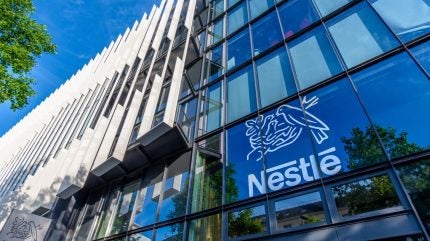
Nestlé CEO Laurent Freixe has suggested the world’s largest food maker is “immune” to tariffs due to the shape of its manufacturing footprint.
US President Donald Trump has threatened tariffs on imports into the US, which has led companies to examine their exposure to taxes on exports and to review their supply chains.

Discover B2B Marketing That Performs
Combine business intelligence and editorial excellence to reach engaged professionals across 36 leading media platforms.
Speaking to reporters today (13 February) after the KitKat and Maggi owner filed its 2024 financial results, Freixe said the company is monitoring the situation but added: “We are in a unique, privileged position which gives us resilience to significant movements. We produce where we sell. Almost everything we sell we make in that given geography – 90% of what we sell in the US is made in the US and so is immune to tariffs. It is the same in China and Europe.”
Asked about the risk from tariffs being imposed on the materials used for its products, Nestlé CFO Anna Manz said it had a “lot of mechanics” at the local level that could be employed if the company needs to change its sourcing.
But she admitted Nestlé’s guidance for this year – to improve organic net sales compared to 2024 – “excludes the impact of tariffs”.
She added: “Tariff moves could change the inflation picture considerably”.

US Tariffs are shifting - will you react or anticipate?
Don’t let policy changes catch you off guard. Stay proactive with real-time data and expert analysis.
By GlobalDataIn prepared remarks earlier, Freixe, who became CEO in September, described the company’s full-year 2024 performance as “solid” in light of a “challenging macro-economic context and soft consumer environment”.
Organic net sales grew by 2.2% year-on-year to SFr91.4bn ($100.8bn), led by coffee, confectionery and pet care and driven by performance in emerging markets and Europe. Net profit was down 2.9% to Sfr10.9bn.
Nestlé said its “real internal growth” – which excludes the impact of pricing from organic sales – was up 0.8%.
The company has launched a three-year cost saving strategy – the Operational Master Plan – which is intended to save the company SFr2.5bn by the end of 2027.
Freixe said: “We are on a journey. It will take time until we are firing on all cylinders.”
Three-quarters of the total savings are expected to come from procurement, notably driven by AI, supplier management and spend consolidation.
Nestlé’s pricing reduced to 1.5% in 2024, from 7.5% the prior year, which Manz said “reflected a reduction in input cost inflation”.
But she said the company will need to take further pricing action because of “significant inflationary pressure in cocoa and coffee”.
The company’s pricing in the North America was just 0.4%, reflecting a tough operating environment and fierce competition.
Manz said: “Growth was disappointing in North America.”
Freixe outlined supply constraints there in coffee creamers and the frozen category being “put under pressure”.
In November, Nestlé unveiled plans to invest $150m to expand a production facility for frozen meals in the US.
Commenting on Nestlé’s performance, analysts at investment bank Stifel said: “We believe [the] FY24 results were reassuring overall. The targets look more and more credible to us with top-line acceleration at the end of the year and comprehensive details on the cost-savings initiatives.”





